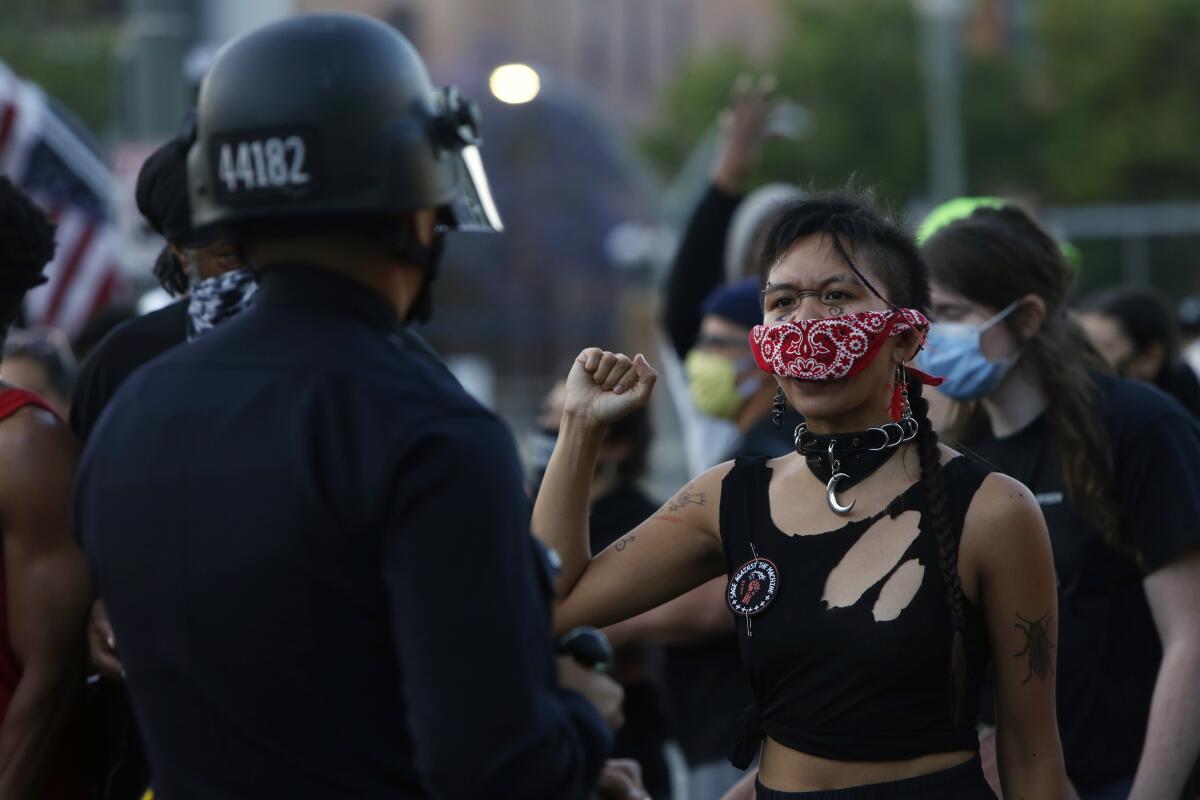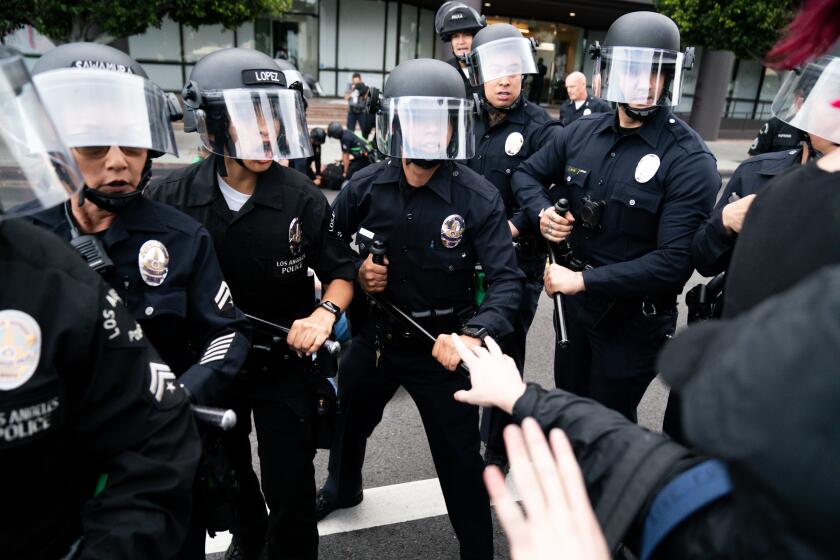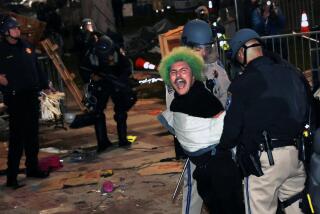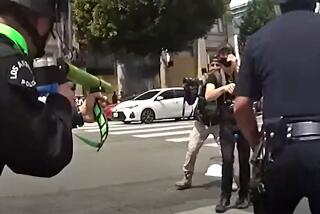LAPD halts use of some projectile weapons at protests after court ruling

- Share via
The Los Angeles Police Department has issued an immediate moratorium on the use of certain projectile weapons at protests after city attorneys interpreted a federal court order as precluding their use under current policies, LAPD Chief Michel Moore said Tuesday.
The moratorium applies to weapons that fire 37-millimeter hard-foam projectiles, which have been used by the LAPD during recent protests to clear crowds after gatherings were declared unlawful. The weapons fire five projectiles at once.
The ban applies only to public demonstrations or other crowd control settings. Other projectiles, including bean bags and other hard-foam rounds, will remain in use in such settings, but under new limits.
The restrictions, which come at a high-stakes moment for the LAPD as it assesses broader protest-related reforms, mark a major win for activists who have long alleged that the LAPD brutalizes demonstrators and violates their constitutional rights when it uses such weapons to clear the streets.
Since last summer, the Times has documented cases where such projectiles exploded a man’s eye, ruptured a man’s testicle, caused severe bleeding in a man’s brain, lacerated a man’s face and left deep welts and bruises across other demonstrators’ heads, torsos and limbs.
“It’s absolutely telling that we needed a restraining order against the police in order to really just exercise our 1st Amendment rights,” said Melina Abdullah of Black Lives Matter-Los Angeles, one of several organizations that won the order in an ongoing lawsuit over the LAPD’s response to last year’s mass protests. “It underscores how completely brutal and violent LAPD is with protesters.”
Under LAPD policy, the guns subject to the moratorium are not meant to be directed at specific targets but to be shot “toward the ground in front of a hostile crowd once an unlawful assembly has been declared.”
Chief Michel Moore’s promises that the LAPD is prepared to facilitate demonstrations related to Derek Chauvin’s trial come at a high-stakes moment for the department.
Protesters have alleged that police have misused the weapons to harm protesters and disperse assemblies that were not violent and represented no threat to officers. Police have said they have used the weapons when crowds grew unruly and dangerous and officers were targeted with bottles, rocks and other objects.
On Monday, U.S. District Judge Consuelo B. Marshall granted a temporary restraining order placing new restrictions on the LAPD’s use of projectile weapons at the request of the activist groups in their lawsuit over the LAPD’s response to last spring’s mass protests.
The activist groups had argued that the LAPD not only violated its own policies for such weapons and badly injured protesters last year, but continued using such weapons in dangerous ways at more recent protests.
Marshall issued the order after deciding that the groups had shown “a likelihood of irreparable injury” at future protests without court intervention. She had rejected a similar claim in July.
In issuing the order, Marshall cited declarations submitted from individuals who were struck by projectiles, as well as a Times story about individuals being badly injured by LAPD projectiles during an unruly gathering after the Lakers’ NBA championship in October.
Her order restricted the use of 40-millimeter and 37-millimeter projectiles to officers who are properly trained on the weapons, and only after police have issued verbal warnings to disperse and have given demonstrators an opportunity to comply. Recent reviews of the LAPD’s handling of last spring’s mass protests found that officers who weren’t properly trained on the weapons had nonetheless used them.
The order also said the weapons may be used only on individuals who “pose a threat of serious bodily harm to others, including law enforcement,” and from at least five feet away, and must not be aimed at people’s heads, faces, necks or spines.
Moore told the Police Commission on Tuesday that city attorneys and police officials determined that continued use of the 37-millimeter weapons, which are not meant to be used in a targeted fashion against individuals, would be inconsistent with the court order, warranting the moratorium.
The 40-millimeter hard-foam projectiles will remain in use. But in a notice that went out to the entire LAPD, officials emphasized the phrase used by Marshall that they only be used against individuals who pose a threat of “serious bodily injury” to officers or others — boldfacing those words in the notice.
Moore also advised officers that, when deciding to use the 40-millimeter or bean bag rounds, they should “to the extent possible” try to record on their body cameras an explanation for why they are using the weapons and identify the person they are targeting and the amount of distance there is between them and their target. Moore noted the minimum distance is five feet.
Moore said other restrictions under the order were already consistent with LAPD policy, such as not aiming projectiles at people’s heads or faces. However, investigations by The Times have shown that officers have violated those policies repeatedly in the last year — both during last year’s spring protests, after the Lakers’ championship victory, and last month during a protest over the clearing of a homeless encampment near Echo Park Lake.
During the commission meeting Tuesday, Commissioner William Briggs asked Moore to consider the restrictions on the weapons in Marshall’s order and be prepared to discuss whether they should be implemented permanently as department policy during a planned discussion on a broader slate of protest-related reforms set for the commission’s meeting next week.
Abdullah credited the new restrictions on the weapons to “brilliant lawyering” by the National Lawyers Guild and other attorneys representing the activist groups, but also cautioned that the restrictions are only a partial win. She noted that the LAPD will still be armed with some of the weapons, and that other local police agencies that use such weapons and operate in and around the city, including the L.A. County Sheriff’s Department, are not subject to the order.
“We’re going to absolutely still be threatened by these weapons,” she said.
More to Read
Sign up for Essential California
The most important California stories and recommendations in your inbox every morning.
You may occasionally receive promotional content from the Los Angeles Times.











